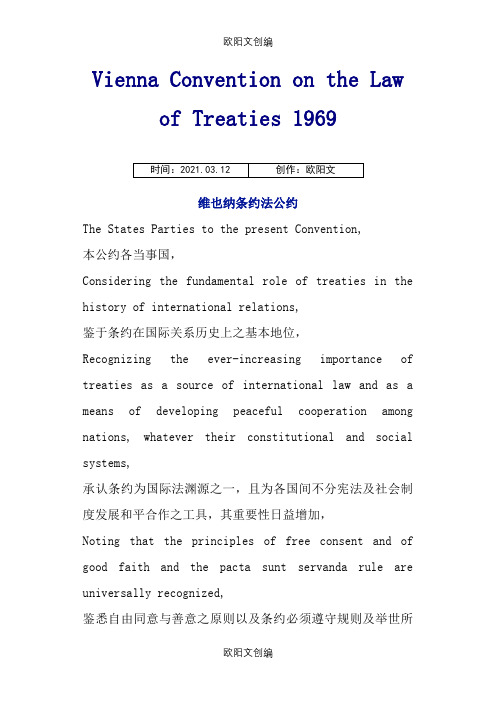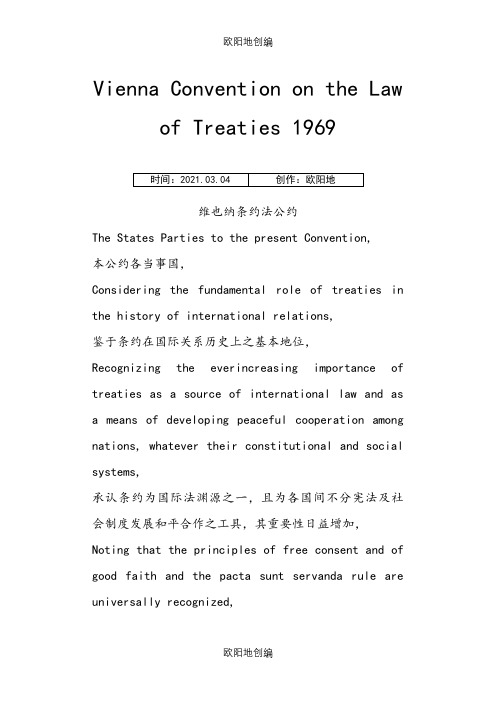国家和国际组织间或国际组织相互间条约法的维也纳公约(中文简体)
- 格式:doc
- 大小:38.50 KB
- 文档页数:13

Vienna Convention on the Law of Treaties 1969维也纳条约法公约The States Parties to the present Convention,本公约各当事国,Considering the fundamental role of treaties in the history of international relations,鉴于条约在国际关系历史上之基本地位,Recognizing the ever-increasing importance of treaties as a source of international law and as a means of developing peaceful cooperation among nations, whatever their constitutional and social systems,承认条约为国际法渊源之一,且为各国间不分宪法及社会制度发展和平合作之工具,其重要性日益增加,Noting that the principles of free consent and of good faith and the pacta sunt servanda rule are universally recognized,鉴悉自由同意与善意之原则以及条约必须遵守规则及举世所承认,Affirming that disputes concerning treaties, like other international disputes, should be settled by peaceful means and in conformity with the principles of justice and international law,确认凡关于条约之争端与其他国际争端同,皆应以和平方法且依正义及国际法之原则解决之,Recalling the determination of the peoples of the United Nations to establish conditions under which justice and respect for the obligations arising from treaties can be maintained,念及联合国人民同兹决心创造适当环境俾克维持正义及尊重由条约而起之义务,Having in mind the principles of international law embodied in the Charter of the United Nations, such as the principles of the equal rights and self-determination of peoples, of the sovereign equality and independence of all States, of non-interference in the domestic affairs of States, of the prohibition of the threat or use of force and of universal respect for, and observance of, human rights and fundamental freedoms for all,鉴及联合国宪章所载之国际法原则,诸如人民平等权利及自决,所有国家主权平等及独立,不干涉各国内政,禁止使用威胁或武力以及普遍尊重与遵守全体人类之人权及基本自由等原则。

Vienna Convention on the Law of Treaties 1969维也纳条约法公约The States Parties to the present Convention,本公约各当事国,Considering the fundamental role of treaties in the history of international relations,鉴于条约在国际关系历史上之基本地位,Recognizing the everincreasing importance of treaties as a source of international law and as a means of developing peaceful cooperation among nations, whatever their constitutional and social systems,承认条约为国际法渊源之一,且为各国间不分宪法及社会制度发展和平合作之工具,其重要性日益增加,Noting that the principles of free consent and of good faith and the pacta sunt servanda rule are universally recognized,鉴悉自由同意与善意之原则以及条约必须遵守规则及举世所承认,Affirming that disputes concerning treaties, like other international disputes, should be settled by peaceful means and in conformity with the principles of justice and international law,确认凡关于条约之争端与其他国际争端同,皆应以和平方法且依正义及国际法之原则解决之,Recalling the determination of the peoples of the United Nations to establish conditions under which justice and respect for the obligations arising from treaties can be maintained,念及联合国人民同兹决心创造适当环境俾克维持正义及尊重由条约而起之义务,Having in mind the principles of international law embodied in the Charter of the United Nations, such as the principles of the equal rights and selfdetermination of peoples, of the sovereign equality and independence of all States, of noninterference in the domestic affairs of States, of the prohibition of the threat or use of forceand of universal respect for, and observance of, human rights and fundamental freedoms for all,鉴及联合国宪章所载之国际法原则,诸如人民平等权利及自决,所有国家主权平等及独立,不干涉各国内政,禁止使用威胁或武力以及普遍尊重与遵守全体人类之人权及基本自由等原则。

《关于国家和国际组织间或国际组织相互间条约法的维也纳公约》联合国条约法会议于1969年在维也纳举行,通过了一项决议,题为“关于《维也纳条约法公约》第1条的决议”,作为《最后文件》的附件。
该决议建议大会将关于国家和国际组织间或国际组织相互间条约问题交给委员会研究。
根据上述建议,大会1969年11月12日第2501(XXIV)号决议建议国际法委员会与主要国际组织共同协商研究这个问题。
在1970年第二十二届会议上,该委员会将这个问题列入其工作方案,并设立了一个小组委员会,负责审议关于该专题研究的初步问题。
委员会通过的该小组委员会的报告(A/CN.4/L.155)要求秘书处做某些筹备工作,特别是在联合国惯例方面,并请小组委员会主席向小组委员会成员提交一份关于这个专题的处理方法和范围的调查问卷。
1971年,在委员会第二十三届会议上,小组委员会向委员会提交了一份报告(A/CN.4/250),其中概述了小组委员会成员对小组委员会主席拟定的调查问卷的看法,并向委员会提出了若干建议,特别是建议任命一名关于这个专题的特别报告员,确认了向秘书长提出的关于做某些筹备工作的请求。
委员会审议并通过了该报告,未作改动。
在该届会议上,委员会任命保尔·路透为该专题的特别报告员。
委员会在1973年至1975年的第二十五届至第二十七届会议以及1977 年至 1982年的第二十九届至第三十四届会议上审议了这个专题。
关于这个专题的审议,委员会面前有特别报告员的报告(文件号见“文件”一节),各国政府及国际组织提供的信息(A/CN.4/339和Add.1-8;A/CN.4/350和Add.1-6,Add.6/Corr.1和Add.7-11)以及联合国秘书处编写的文件(A/CN.4/L.161和Add.1和2;A/CN.4/277和A/CN.4/281)。
1973年,在其第二十五届会议上,委员会请特别报告员在其前两份报告和该届会议期间提出的评论的基础上开始拟定一套条款草案。

維也納條約法公約Vienna Convention on the Law of Treaties一九六九年五月二十三日訂於維也納Done at Vienna on 23 May 1969.Entered into force on 27 January 1980. UnitedNations, Treaty Series, vol. 1155, p. 331本公約各當事國,The States Parties to the present Convention,鑒於條約在國際關係歷史上之基本地位,Considering the fundamental role of treaties in the history of international relations,承認條約為國際法淵源之一,且為各國間不分憲法及社會制度發展和平合作之工具,其重要性日益增加,Recognizing the ever-increasing importance of treaties as a source of international law and as a means of developing peaceful cooperation among nations, whatever their constitutional and social systems,鑒悉自由同意與善意之原則以及條約必須遵守規則乃舉世所承認,Noting that the principles of free consent and of good faith and the pacta sunt servanda rule are universally recognized,確認凡關於條約之爭端與其他國際爭端同,皆應以和平方法且依正義及國際法之原則解決之,Affirming that disputes concerning treaties, like other international disputes, should be settled by peaceful means and in conformity with the principles of justice and international law,念及聯合國人民同玆決心創造適當環境,俾克維持正義及尊重由條約而起之義務,Recalling the determination of the peoples of the United Nations to establish conditions under which justice and respect for the obligations arising from treaties can be maintained,鑒及聯合國憲章所載之國際法原則,諸如人民平等權利及自決,所有國家主權平等及獨立,不干涉各國內政,禁止使用威脅或武力以及普遍尊重與遵守全體人類之人權及基本自由等原則,Having in mind the principles of international law embodied in the Charter of the United Nations, such as the principles of the equal rights andself-determination of peoples, of the sovereign equality and independence of all States, ofnon-interference in the domestic affairs of States, of the prohibition of the threat or use of force and of universal respect for, and observance of, human rights and fundamental freedoms for all,深信本公約所達成之條約法之編纂及逐漸發展可促進憲章所楬櫫之聯合國宗旨,即維持國際和平及安全,發展國際間之友好關係並達成其彼此合作, Believing that the codification and progressive development of the law of treaties achieved in the present Convention will promote the purposes of the United Nations set forth in the Charter,namely, the maintenance of international peace and security, the development of friendly relationsand the achievement of cooperation among nations,確認凡未經本公約各條規定之問題,將仍以國際習慣法規則為準, Affirming that the rules of customaryinternational law will continue to govern questions not regulated by the provisions of thepresent Convention,爰議定條款如下:Have agreed as follows:第一編 導言PART I. INTRODUCTION 第一條 本公約之範圍Article 1 Scope of the present Convention 本公約適用於國家間之條約。

维也纳条约法公约文章属性•【缔约国】•【条约领域】政治•【公布日期】1969.05.23•【条约类别】公约•【签订地点】维也纳正文维也纳条约法公约(本公约于1980年1月27日生效。
中华人民共和国政府于1997年9月3日交存加入书,同时声明:1.中华人民共和国对《维也纳条约法公约》第66条予以保留。
2.台湾当局于1970年4月27日以中国名义在《维也纳条约法公约》上的签字、批准是非法的、无效的。
本公约于1997年10月3日对我生效,并适用于香港、澳门。
)本公约各当事国,鉴于条约在国际关系历史上之基本地位,承认条约为国际法渊源之一,且为各国间不分宪法及社会制度发展和平合作之工具,其重要性日益增加,鉴悉自由同意与善意之原则以及条约必须遵守规则及举世所承认,确认凡关于条约之争端与其他国际争端同,皆应以和平方法且依正义及国际法之原则解决之,念及联合国人民同兹决心创造适当环境俾克维持正义及尊重由条约而起之义务,鉴及联合国宪章所载之国际法原则,诸如人民平等权利及自决,所有国家主权平等及独立,不干涉各国内政,禁止使用威胁或武力以及普遍尊重与遵守全体人类之人权及基本自由等原则。
深信本公约所达成之条约法之编纂及逐渐发展可促进宪章所揭示之联合国宗旨,即维持国际和平与安全,发展国际间之友好关系并达成其彼此合作,确认凡未经本公约各条规定之问题,将仍以国际习惯法规则为准,爰议定条款如下:第一编导言第一条本公约之范围本公约适用于国家间之条约。
第二条用语一、就适用本公约而言:(甲)称‘条约’者,谓国家间所缔结而以国际法为准之国际书面协定,不论其载于一项单独文书或两项以上相互有关之文书内,亦不论其特定名称如何;(乙)称‘批准’,‘接受’,‘赞同’及‘加入’者,各依本义指一国据以在国际上确定其同意受条约拘束之国际行为;(丙)称‘全权证书’者,谓一国主管当局所颁发,指派一人或数人代表该国谈判,议定或认证条约约文,表示该国同意受条约拘束,或完成有关条约之任何其他行为之文件;(丁)称‘保留’者,谓一国于签署,批准、接受、赞同或加入条约时所做之片面声明,不论措辞或名称如何,其目的在摒除或更改条约中若干规定对该国适用时之法律效果;(戊)称‘谈判国’者,谓参与草拟及议定条约约文之国家;(己)称‘缔约国’者,谓不问条约已未生效,同意受条约拘束之国家;(庚)称‘当事国’者,谓同意承受条约拘束及条约对其有效之国家;(辛)称‘第三国’者,谓非条约当事国之国家;(壬)称‘国际组织’者,谓政府间之组织。

Vienna Convention on the Law ofTreaties 1969欧阳家百(2021.03.07)维也纳条约法公约The States Parties to the present Convention,本公约各当事国,Considering the fundamental role of treaties in the history of international relations,鉴于条约在国际关系历史上之基本地位,Recognizing the everincreasing importance of treaties as a source of international law and as a means of developing peaceful cooperation among nations, whatever their constitutional and social systems,承认条约为国际法渊源之一,且为各国间不分宪法及社会制度发展和平合作之工具,其重要性日益增加,Noting that the principles of free consent and of good faith and the pacta sunt servanda rule are universally recognized,鉴悉自由同意与善意之原则以及条约必须遵守规则及举世所承认,Affirming that disputes concerning treaties, like other international disputes, should be settled by peaceful means and in conformity with the principles of justice and international law,确认凡关于条约之争端与其他国际争端同,皆应以和平方法且依正义及国际法之原则解决之,Recalling the determination of the peoples of the United Nations to establish conditions under which justice and respect for the obligations arising from treaties can be maintained,念及联合国人民同兹决心创造适当环境俾克维持正义及尊重由条约而起之义务,Having in mind the principles of international law embodied in the Charter of the United Nations, such as the principles of the equal rights and selfdetermination of peoples, of the sovereign equality and independence of all States, of noninterference in the domestic affairs of States, of the prohibition of the threat or use of force and of universal respect for, and observance of, human rights and fundamental freedoms for all,鉴及联合国宪章所载之国际法原则,诸如人民平等权利及自决,所有国家主权平等及独立,不干涉各国内政,禁止使用威胁或武力以及普遍尊重与遵守全体人类之人权及基本自由等原则。
Vienna Convention on the Law of Treaties 1969维也纳条约法公约The States Parties to the present Convention,本公约各当事国,Considering the fundamental role of treaties in the history ofinternational relations,鉴于条约在国际关系历史上之基本地位,Recognizing the everincreasing importance of treaties as a source ofinternational law and as a means of developing peacefulcooperation among nations, whatever their constitutional and socialsystems,承认条约为国际法渊源之一,且为各国间不分宪法及社会制度发展和平合作之工具,其重要性日益增加,Noting that the principles of free consent and of good faith and thepacta sunt servanda rule are universally recognized,鉴悉自由同意与善意之原则以及条约必须遵守规则及举世所承认,Affirming that disputes concerning treaties, like other internationaldisputes, should be settled by peaceful means and in conformity with the principles of justice and international law,确认凡关于条约之争端与其他国际争端同,皆应以和平方法且依正义及国际法之原则解决之,Recalling the determination of the peoples of the United Nations to establish conditions under which justice and respect for the obligations arising from treaties can be maintained,念及联合国人民同兹决心创造适当环境俾克维持正义及尊重由条约而起之义务,Having in mind the principles of international law embodied in the Charter of the United Nations, such as the principles of the equal rights and selfdetermination of peoples, of the sovereign equality and independence of all States, of noninterference in the domestic affairs of States, of the prohibition of the threat or use of force and of universal respect for, and observance of, human rights and fundamental freedoms for all,鉴及联合国宪章所载之国际法原则,诸如人民平等权利及自决,所有国家主权平等及独立,不干涉各国内政,禁止使用威胁或武力以及普遍尊重与遵守全体人类之人权及基本自由等原则。
Vienna Convention on the Law of Treaties 1969维也纳条约法公约The States Parties to the present Convention,本公约各当事国,Considering the fundamental role of treaties in the history of international relations,鉴于条约在国际关系历史上之基本地位,Recognizing the everincreasing importance of treaties as a source of international law and as a means of developing peaceful cooperation among nations, whatever their constitutional and social systems,承认条约为国际法渊源之一,且为各国间不分宪法及社会制度发展和平合作之工具,其重要性日益增加,Noting that the principles of free consent and of good faith and the pacta sunt servanda rule are universally recognized,鉴悉自由同意与善意之原则以及条约必须遵守规则及举世所承认,Affirming that disputes concerning treaties, like other international disputes, should be settled by peaceful means and in conformitywith the principles of justice and international law,确认凡关于条约之争端与其他国际争端同,皆应以和平方法且依正义及国际法之原则解决之,Recalling the determination of the peoples of the United Nations to establish conditions under which justice and respect for the obligations arising from treaties can be maintained,念及联合国人民同兹决心创造适当环境俾克维持正义及尊重由条约而起之义务,Having in mind the principles of international law embodied in the Charter of the United Nations, such as the principles of the equal rights and selfdetermination of peoples, of the sovereign equality and independence of all States, of noninterference in the domestic affairs of States, of the prohibition of the threat or use of force and of universal respect for, and observance of, human rights and fundamental freedoms for all,鉴及联合国宪章所载之国际法原则,诸如人民平等权利及自决,所有国家主权平等及独立,不干涉各国内政,禁止使用威胁或武力以及普遍尊重与遵守全体人类之人权及基本自由等原则。
维也纳条约法公约中英文版————————————————————————————————作者:————————————————————————————————日期:2Vienna Convention on the Law of Treaties 1969维也纳条约法公约The States Parties to the present Convention,本公约各当事国,Considering the fundamental role of treaties in the history of international relations,鉴于条约在国际关系历史上之基本地位,Recognizing the ever-increasing importance of treaties as a source of international law and as a means of developing peaceful cooperation among nations, whatever their constitutional and social systems,承认条约为国际法渊源之一,且为各国间不分宪法及社会制度发展和平合作之工具,其重要性日益增加,Noting that the principles of free consent and of good faith and the pacta sunt servanda rule are universally recognized,鉴悉自由同意与善意之原则以及条约必须遵守规则及举世所承认,Affirming that disputes concerning treaties, like other international disputes, should be settled by peaceful means and in conformity with the principles of justice and international law,确认凡关于条约之争端与其他国际争端同,皆应以和平方法且依正义及国际法之原则解决之,Recalling the determination of the peoples of the United Nations to establish conditions under which justice and respect for the obligations arising from treaties can be maintained,念及联合国人民同兹决心创造适当环境俾克维持正义及尊重由条约而起之义务,Having in mind the principles of international law embodied in the Charter of the United Nations, such as the principles of the equal rights and self-determination of peoples, of the sovereign equality and independence of all States, of non-interference in the domestic affairs of States, of the prohibition of the threat or use of force and of universal respect for, and observance of, human rights and fundamental freedoms for all,鉴及联合国宪章所载之国际法原则,诸如人民平等权利及自决,所有国家主权平等及独立,不干涉各国内政,禁止使用威胁或武力以及普遍尊重与遵守全体人类之人权及基本自由等原则。
Vienna Convention on the Law of Treaties1969维也纳条约法公约The States Parties to the present Convention,本公约各当事国,Considering the fundamental role of treaties in the history of international relations,鉴于条约在国际关系历史上之基本地位,Recognizing the ever-increasing importance of treaties as a source of international law and as a means of developing peaceful cooperation among nations, whatever their constitutional and social systems,承认条约为国际法渊源之一,且为各国间不分宪法及社会制度发展和平合作之工具,其重要性日益增加,Noting that the principles of free consent and of good faith and the pacta sunt servanda rule are universally recognized,鉴悉自由同意与善意之原则以及条约必须遵守规则及举世所承认,Affirming that disputes concerning treaties, like other international disputes, should be settled by peaceful means and in conformity with the principles of justice and international law,确认凡关于条约之争端与其他国际争端同,皆应以和平方法且依正义及国际法之原则解决之,Recalling the determination of the peoples of the United Nations to establish conditions under which justice and respect for the obligations arising from treaties can be maintained,念及联合国人民同兹决心创造适当环境俾克维持正义及尊重由条约而起之义务,Having in mind the principles of international law embodied in the Charter of the United Nations, such as the principles of the equal rights and self-determination of peoples, of the sovereign equality and independence of all States, of non-interference in the domestic affairs of States, of the prohibition of the threat or use of force and of universal respect for, and observance of, human rights and fundamental freedoms for all,鉴及联合国宪章所载之国际法原则,诸如人民平等权利及自决,所有国家主权平等及独立,不干涉各国内政,禁止使用威胁或武力以及普遍尊重与遵守全体人类之人权及基本自由等原则。
关于国家和国际组织间或国际组织相互间条约法的维也纳公约(1986年3月21日联合国条约法会议订于维也纳)本公约各当事方,考虑到条约在国际关系历史上的重要作用,认识到条约的合意性质及其作为国际法渊源之一的重要性正日益增加,注意到自由同意和善意的原则以及条约必须遵守的规则已获举世所承认,确认在全球一级加强国际法的编纂和逐渐发展进程的重要性,相信编纂和逐渐发展关于国家和国际组织间或国际组织相互间的条约的规则是在国际关系上加强法律秩序和有助于实现联合国宗旨的手段,考虑到联合国宪章所载的国际法原则,诸如人民平等权利和自决、一切国家主权平等及独立、不干涉各国内政、禁止以武力威胁或使用武力、以及普遍尊重和遵守全体人类的人权和基本自由等原则,考虑到1969年维也纳条约法公约的各项规定,认识到国家间条约法与国家和国际组织间或国际组织相互间的条约法的关系,考虑到国家和国际组织间或国际组织相互间的条约作为发展国际关系的有用工具和确保不分宪法体制及社会制度的各国间和平合作条件的重要性,考虑到国际组织作为不同于国家的国际法主体为当事方的条约的特性,注意到国际组织具有为执行其职务和实现其宗旨所必需的缔约能力,认识到国际组织与各国间或各组织相互间缔结条约的惯例应充分按照其组成文书,确认本公约的任何规则不得解释为影响由国际组织的规则加以规定的该组织与其成员国间的关系,又确认关于条约的争端与其他国际争端相同,都应依照联合国宪章以和平方法并依照公正原则和国际法加以解决,又确认本公约未予规定的事项继续受习惯国际法规则的支配,经协议如下:第一部分导言第一条本公约的范围本公约适用于:(a)一个或更多国家和一个或更多国际组织间的条约,和(b)国际组织相互间的条约。
第二条用语1.为本公约的目的:(a)“条约”指(1)一个或更多国家和一个或更多国际组织间,或(2)国际组织相互间以书面缔结并受国际法支配的国际协议,不论其载于一项单独的文书或两项或更多有关的文书内,也不论其特定的名称为何;(b之一)“批准”指一国用该名称在国际上确定该国同意受一项条约拘束的国际行为;(b之二)“正式确认行为”指国际组织用以在国际上确定其同意受一项条约拘束并相当于一国表示批准的国际行为;(b之三)“接受”、“核准”和“加入”分别指一国或一国际组织用该名称在国际上确定其同意受一项条约拘束的国际行为;(c)“全权证书”指一国主管当局或一国际组织主管机关所发的档,以指定一人或数人代表该国或组织谈判、议定或认证条约的约文,表示该国或该组织同意受条约拘束,或完成有关条约的其他行为;(d)“保留”指一国或一国际组织在签署、批准、正式确认、接受、核准或加入条约时所作的单方面声明,不论其措辞或名称为何,其目的在于排除或更改条约中某些规定对该国或该国际组织适用时的法律效果;(e)“谈判国”和“谈判组织”分别指参与草拟和议定条约约文的:(1)国家,或(2)国际组织;(f)“缔约国”和“缔约组织”分别指不论该条约已否生效,已同意受条约拘束的:(1)国家,或(2)国际组织;(g)“当事方”指已同意受该条约拘束,而且该条约已对其生效的国家或国际组织;(h)“第三国”和“第三组织”分别指不是该条约当事方的:(1)国家,或(2)国际组织;(i)“国际组织”指政府间组织;(j)“组织的规则”特别指该组织的组成文书、按照这些文书通过的决定和决议、以及确立的惯例。
2.第1款关于本公约内各项用语的规定,不妨碍此等用语在任何国家的国内法或任何国际组织的规则中的使用或所具有的意义。
第三条不属本公约范围的国际协定本公约不适用于:(1)当事方为一个或更多的国家、一个或更多国际组织和一个或更多不是国家或组织的国际法主体的国际协定;(2)当事方为一个或更多国际组织和一个或更多不是国家或组织的国际法主体的国际协定;(3)一个或更多国家和一个或更多国际组织间或国际组织相互间的非书面国际协定;或(4)不是国家或国际组织的国际法主体间的国际协定;这一事实应不影响:(a)这些协定的法律效力;(b)本公约所载任何规则对这些协定的适用,如依照国际法,无须根据本公约,这些协定原应受上述规则的支配;(c)本公约对国家和国际组织间的关系或各组织相互间的关系的适用,如这种关系还有其他国际法主体的为当事方的国际协定的支配。
第四条本公约不溯及既往在不妨碍本公约所载即使本公约不加规定根据国际法原应适用于一个或更多国家和一个或更多国际组织间或国际组织相互间的条约的任何规则的适用的情况下,本公约仅适用于本公约对这些国家和这些国际组织生效后所缔结的这类条约。
第五条组成国际组织的条约和在国际组织内议定的条约本公约适用于一个或更多国家和一个或更多国际组织间作为国际组织组成文书的任何条约和在国际组织内议定的任何条约,但不妨碍该组织的任何有关的规则。
第二部分条约的缔结和生效第一节条约的缔结第六条国际组织缔结条约的能力国际组织缔结条约的能力依照该组织的规则。
第七条全权证书1.有下列情形之一时,一个人被认为为了议定或认证条约约文或表示一国同意受条约拘束的目的而代表该国:(a)他出示了适当的全权证书;(b)从惯例或其他情况看来,各有关国家和国际组织的意思认为该人为这些目的代表该国,而无须出示全权证书。
2.由于所任职务,无须出示全权证书,被认为代表其国家的人如下:(a)国家元首、政府首脑及外交部长:为了实施有关缔结一个或更多国家和一个或更多国际组织的条约的一切行为;(b)国家任命出席国际会议的代表:为了议定国家和国际组织间的条约约文;(c)国家任命派往国际组织或其某一机关的代表:为了在该组织或机关内议定条约约文;(d)常驻国际组织代表团团长:为了议定派遣国和该组织间的条约约文;3.有下列情形之一时,一个人被认为为了议定或认证条约约文或为了表示一国际组织同意受条约拘束的目的而代表该组织:(a)他出示了适当的全权证书;(b)从各种情况看来,各有关国家和国际组织的意思认为该人按照该组织的规则为这些目的代表该组织,而无须出示全权证书。
第八条对未获授权所实施的行为的事后确认根据第7条不能被认为已获授权代表一国或一国际组织缔结条约的人,其实施的有关缔结条约的行为,非经该国或该国际组织事后确认,不发生法律效果。
第九条约文的规定1.除第2款规定的情形外,条约约文的议定应经参加起草约文的全体国家和国际组织或按情况全体国际组织的同意。
2.在国际会议上,条约约文的议定应按照该会议参加者达成协议的程序进行,但如未就任何这种程序达成协议,则约文的议定应经出席并参加表决的参加者的三分之二多数通过,除非参加者以同样多数决定适用另一规则。
第十条约文的认证1.一个或更多国家和一个或更多国际组织间的条约约文依下列程序之一,确定为作准的和最后的约文:(a)依约文所规定或参与草拟约文的国家和国际组织所协定的程序;(b)如无这种程序,则这些国家和国际组织的代表在条约约文上或在载有约文的会议最后档上实施签署、尚待认可的签署或草签。
2.国际组织间的条约的约文依下列程序之一,确定为作准的和最后的约文:(a)依约文所规定或参与草拟约文的国际组织所协定的程序;(b)如无这种程序,则由这些国际组织的代表在条约约文上或在载有约文的会议最后档上实施签署、尚待认可的签署或草签。
第十一条表示同意受条约拘束的方式1.一国同意受条约拘束,可以签署、交换构成条约的文书、批准、接受、核准或加入,或以所协定的任何其他方式表示。
2.一国际组织同意受条约拘束,可以签署、交换构成条约的文书、正式确认、接受、核准或加入、或以所协定的任何其他方式表示。
第十二条以签署表示同意受条约拘束1.有下列情形之一时,一国或一国际组织以该国或该组织代表的签署表示同意受条约拘束;(a)该条约规定签署应有这种效果;(b)通过其他方法确定各谈判国和谈判组织或按情况各谈判组织已达成协议签署应有这种效果;(c)从该国或该组织代表全权证书可以看出,或于谈判时已表示,该国或该组织有意使签署有这种效果。
2.为第1款的目的;(a)如经确定各谈判国和谈判组织或按情况各谈判组织有此协定,约文的草签构成对该条约的签署;(b)一国或一国际组织代表对条约实施的尚待认可的签署,如经该国或该组织确认,即构成对该条约的正式签署。
第十三条以交换构成条约的文书表示同意受条约拘束有下列情形之一时,国家或国际组织相互间以交换构成一项条约的一些文书,表示同意受该条约拘束:(a)这些文书规定其交换应有这种效果;(b)通过其他方法确定这些国家和组织或按情况这些组织已达成协议的文书的交换应有这种效果。
第十四条以批准、正式确认、接受或核准表示同意受条约拘束1.有下列情形之一时,一国以批准表示同意受条约拘束:(a)条约规定以批准方式表示这种同意;(b)通过其他方式确定各谈判国和谈判组织协定需要批准;(c)该国代表已对条约作须经批准的签署;(d)从该国代表全权证书可以看出,或于谈判时已表示,该国有意对条约作须经批准的签署。
2.有下列情形之一时,一国际组织以正式确认表示同意受条约拘束:(a)条约规定以正式确认表示这种同意;(b)通过其他方法确定谈判国和谈判组织或按情况各谈判组织协定需要正式确认;(c)该组织代表已对条约作须经正式确认的签署;(d)从该组织代表全权证书可以看出,或于谈判时已表示,该组织有意对条约作须经正式确认的签署。
3.一国或一国际组织以接受或核准方式表示同意受条约拘束,其条件与适用于批准或按情况正式确认者相同。
第十五条以加入表示同意受条约拘束有下列情形之一时,一国或一国际组织以加入表示同意受条约拘束:(a)该条约规定该国或该组织可以加入方式表示这种同意;(b)通过其他方法确定各谈判国和谈判组织或按情况各谈判组织已达成协议该国或该组织可以加入方式表示这种同意;(c)全体当事方嗣后协定该国或该组织可以加入方式表示这种同意。
第十六条批准书、正式确认书、接受书、核准书或加入书的交换或存放1.除条约另有规定外,批准书、正式确认书、接受书、核准书或加入书于下列情形之一发生时即确定一国或一国际组织同意受一个或更多国家和一个或更多国际组织间条约的拘束:(a)各缔约国和缔约组织交换文书时;(b)将文书存放于保管机关时;(c)将文书通知各缔约国和缔约组织或保管机关时,但以有此协议为条件。
2.除条约另有规定外,正式确认书、接受书、核准书或加入书于下列情形之一发生时即确定一国际组织同意受国际组织相互间条约的拘束:(a)各缔约组织间交换文书时;(b)将文书存放于保管机关时;(c)将文书通知各缔约组织或保管机关时,但以有此协议为条件。
第十七条同意受条约一部分的拘束和对不同规定的选择1.在不妨碍第19至第23条的情况下,一国或一国际组织同意受条约一部分的拘束,仅于条约有此许可或各缔约国和缔约组织或按情况各缔约组织有此协定时,才是有效的。